After a fitful night’s sleep, partly as the result of the incredibly high temperature, partly because he was still coming down from his adrenalin fix, Tallis got up, packed up some things and left the hotel shortly before eight in the morning, the carrier bag containing the contaminated clothes swinging idly from his hand.
A saffron-coloured sun beat down hard upon him. Within minutes, his shirt was stuck to his back and perspiration was oozing in a constant trickle from his brow. Heat was doing funny things to his vision. Colours seemed more vivid, shapes less defined. Pavement, buildings, cars looked as though they might burst into flames.
His destination was Eminonu, a port bustling with traders keen to sell goods or offer trips up the Bosphorus. A cooling breeze usually blew in off the water but not today. A small podgy individual with down-turned eyes caught Tallis’s attention. For some reason he had no takers even though the small boat he was chartering looked sturdy enough. Expecting to haggle, Tallis spoke in English and asked how much for a two-hour trip. Predictably, Podgy named his price, which was eye-wateringly high. Tallis immediately offered half. Podgy looked insulted. Tallis shrugged. Podgy broke into a grin, a sign that he considered Tallis a worthy adversary, and offered him a cold drink. Tallis accepted with a gracious smile. All part of the game. He discovered that the little man was called Kerim. ‘Look, Kerim,’ Tallis said, feeling the delicious chill of ice-cold water at the back of his throat, ‘no need to do the full trip. How about you take me as far as the Fortress of Europe and I’ll get the bus back?’
Kerim clutched a hand to his chest as though he was having a heart attack, shook his head, his expression dolorous. ‘Not good. I have expensive wife.’ His Turkish accent was as thick as the coffee.
Tallis let out a laugh. ‘More fool you.’
‘And many, many children,’ Kerim said, face forlorn.
Christ, the bloke could win a BAFTA, Tallis thought. ‘All right,’ he said, feigning sympathy. ‘Full trip, there and back with a twenty-minute stop at the Fortress.’
‘Is better,’ Kerim said, significantly brightening up.
‘And something else,’ Tallis said, lowering his voice.
‘I very quiet,’ Kerim said, pointing to his mouth. ‘I say nothing.’
You’d better not, pal, Tallis thought, jaw grinding at the terrible yet calculated risk he was about to take. Kerim leant in close, allowing Tallis to explain what he wanted the little man to do, that there would be a great deal of money paid if he looked after something he was about to give him, but dire consequences, not only for him but for his family, should he default, then he offered a little more than his original sum for the trip, which, like the good businessman Kerim was, he accepted with a small bow.
Rumeli Hisari was a maze of steep, narrow cobblestone streets leading to tranquil Muslim cemeteries in a fortress setting. Everywhere were reminders of its fifteenth-century past, and the grand plans of Mehmet the Conqueror in his quest to take Constantinople. Much as Tallis adored history, he couldn’t have been less interested. He was looking for a suitable place to get rid of his carrier bag full of clothes. In a little less than ten minutes, he found it. Although most hotel and restaurant lavatories were of the modern flush design, public conveniences remained stubbornly old-fashioned, of the squat-over-the-slot variety. Setting aside any squeamishness, he took out his belongings and thrust them deep into the bowels of the latrine. Nobody in their right mind would try to retrieve them. Ten minutes later, he was back on the boat, allowing his offending arm to trail in the deep and narrow waters of the Bosphorus.
After checking and booking a KLM flight out of Ataturk to Spain, part of a set of precautionary measures following the killing and the previous night’s excitement, he spent the rest of the day lying low, eating a simple meal in the hotel restaurant before retiring to bed early. Deeply asleep, he was suddenly alerted to someone hammering on his door. ‘All right, all right,’ he said, dragging on a pair of boxers, instantly awake. ‘Who is it?’
‘Polis!’
Tallis glanced at his watch. It said two-twenty in the morning. ‘You got ID?’ he called out.
More banging.
He took a deep breath, opened the door a crack, clocking two men in plain clothes flanked by two police officers with firearms. Shit. He opened his mouth to say something. The door burst open. An outstretched fist shot out. Connecting.
Next stop darkness.
TALLIS came round feeling muzzy. Half-naked, feet bare, handcuffed, he was lying flat on his back on a piece of thin cardboard. His mouth was dry, as if it were laminated, and his temple throbbed with a viciousness he’d only experienced once before in his life after getting legless, at the age of seventeen, on a bottle of rum. He gingerly ran his cuffed fingers over his body. No broken bones, only bruises.
He looked around. Low-wattage light swinging from the ceiling throwing a nicotine glow on walls the colour of British cement. A hole in the ground signalling a convenience, the malodorous smell and dark cloud of flies buzzing round the entrance further confirmation. A dodgy-looking stain, the colour of dried pig’s blood, on the floor to his right. A steel door, with a slot in it for those outside to see in, remained resolutely shut. So much for Turkish hospitality, he thought dryly. There was no sound of faraway traffic, no human voice, no birdsong, so he guessed he was deep in the bowels of a building. The size of the cell, for that’s what it was, was the human equivalent of a battery hen’s coop. And, Christ, it was hot. His lungs felt as if they were sticking to his ribs. Might as well shove him in an oven, turn it to 200 degrees and roast him.
He staggered to his feet, tried to get his bearings, tried to focus. His watch was missing from his wrist so he had no idea of time. Without natural light he couldn’t even make an estimate. Wherever he’d been taken, he doubted that it was a police station. That worried him.
He retreated to the corner of his cell. Best he could do was conserve his energy, stay upbeat. There was absolutely nothing to connect him to the dead man so it was pointless to speculate about the reason he’d been brought and banged up there—wherever there was. Fear of the unknown was his greatest enemy. He refused to entertain the notion of detention centres and secret police, of places where men were detained without charge or trial, or of ghost prisoners held in legal limbo. He had a high pain threshold, but even seasoned soldiers knew that the mental anticipation and anguish was often worse than the horror itself. As soon as his captors came for him, he decided to play the role of outraged tourist. No heroics. No trying to beat the system. But plain old browned-off from Britain. Oh, and act frightened, he thought. Remember, he repeated to himself, you’re David Miller, boring, lowly IT consultant.
At last, he heard some movement and the scraping sound of metal against metal. The slot in the door drew back. A face with midnight eyes peered in, expressionless, followed by another face, which Tallis immediately recognised. On seeing Ertas, he got up. ‘Captain,’ he began, hope briefly rising. ‘So glad—’ Before he could complete his sentence, the slot slammed shut. Irritated, Tallis hunkered back down on the cardboard. At least he wouldn’t freeze to death.
Hours seemed to pass. He was getting seriously dehydrated, his thinking lacking clarity, becoming muddled. Who was Ertas? Was he part of the administrative police keeping track of foreigners, the judicial police investigating crimes or the dreaded political police who combatted subversives of any denomination? Bound to be crossovers, Tallis thought foggily, or maybe Ertas belonged to none of these groups.
Читать дальше












